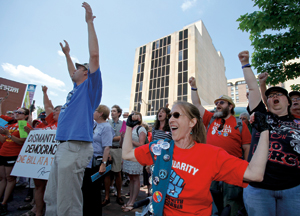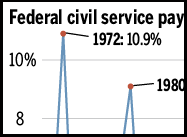CQ WEEKLY – VANTAGE POINT
June 9, 2012 – 12:07 p.m.
Eroding Union Power
By Shawn Zeller, CQ Staff
Republicans eagerly claim that last week’s recall election in Wisconsin, in which Republican Gov.

|
||
|
This fall’s election will better gauge unions’ power. But another test is playing out in Congress. Federal employee unions want to stave off an unprecedented extension of the freeze on cost-of-living adjustments for civil service pay into a third year, and also to beat back Republican plans to make them pay more for their pensions. Republicans want to reduce the federal budget while avoiding the big defense cuts that would be required by an end-of-year sequester, and one alternative is to slice into federal employee pay and benefits.
“Sadly, I think the result of the recall election in Wisconsin has major implications for federal employees,” says William R. Dougan, national president of the National Federation of Federal Employees, which represents 110,000 civil servants at six different Cabinet departments. Republicans, he says, “will be more emboldened than ever to attack federal employee unions.”
Unfortunately for the unions, Democrats aren’t putting up much of a fight. Last week, none objected when the House Appropriations Subcommittee on Financial Services and General Government approved an extension of the pay freeze. A week earlier, the House passed a spending bill for military construction and the Veterans Affairs Department that included language making it clear that it foresaw no raises for civilian workers.

|
||
|
President Obama has pledged to veto the Military Construction-VA bill if it’s not revised, in part because of the pay freeze. But union members aren’t happy with his proposal either: a 0.5 percent pay increase in fiscal 2013. When Obama announced it in January, John Gage, president of the largest federal employee union, the American Federation of Government Employees, called it “miniscule.”
House Democrats did protest last month when Republicans passed a bill to increase by 5 percent the amount that federal employees contribute to their pensions. But even on that issue, unions can probably expect to take a hit. In his budget proposal for fiscal 2013, Obama said he too wants to increase pension contributions by federal workers, although more modestly — an extra 0.4 percent of their pay for each of three years, beginning in 2013. Gage called the plan a “sop to the right wing.”
But since the financial crisis hit in 2008, support for the unions’ position on pay has eroded from the time when Congress routinely awarded annual increases.
“A lot of people in the private sector have taken pay cuts or they’ve been laid off,” says Andrew G. Biggs, a resident scholar at the American Enterprise Institute, a conservative think tank, “so it’s going to be hard to find people who are sympathetic” to federal workers.